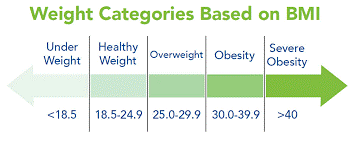- Camp Clinic : Monday to Friday : 7:30am - 9:30am & Evening : 5:30pm - 7:30pm
- Dhole Patil Clinic : Monday to Saturday 1:30pm - 4:30pm
OBESITY

Obesity is a complex disease involving an excessive amount of body fat. Obesity isn't just a cosmetic concern. It is a medical problem that increases your risk of other diseases and health problems, such as heart disease, diabetes, high blood pressure and certain cancers.
There are many reasons why some people have difficulty avoiding obesity. Usually, obesity results from a combination of inherited factors, combined with the environment and personal diet and exercise choices.
The good news is that even modest weight loss can improve or prevent the health problems associated with obesity. Dietary changes, increased physical activity and behavior changes can help you lose weight. Prescription medications and weight-loss procedures are additional options for
treating obesity.Obesity is diagnosed when your body mass index (BMI) is 30 or higher. To determine your body mass index, divide your weight in kilograms by your height in meters squared.

Although there are genetic, behavioral, metabolic and hormonal influences on body weight, obesity occurs when you take in more calories than you burn through exercise and normal daily activities. Your body stores these excess calories as fat.
Other weight-related issues that may affect your quality of life causing depression, disability, sexual problem, shame and guilt, social isolation, lower work achievement.
People with obesity might eat more calories before feeling full, feel hungry sooner, or eat more due to stress or anxiety.
Obesity tends to run in families. That's not just because of the genes they share. Family members also tend to share similar eating and activity habits.
Unhealthy diet: A diet that's high in calories, lacking in fruits and vegetables, full of fast food, and laden with high-calorie beverages and oversized portions contributes to weight gain.
Liquid calories: People can drink many calories without feeling full, especially calories from alcohol. Other high-calorie beverages, such as sugared soft drinks, can contribute to significant weight gain.
Inactivity: If you have a sedentary lifestyle, you can easily take in more calories every day than you burn through exercise and routine daily activities. Looking at computer, tablet and phone screens is a sedentary activity. The number of hours you spend in front of a screen is highly associated with weight gain..
Some medications can lead to weight gain if you don't compensate through diet or activity. These medications include some antidepressants, anti-seizure medications, diabetes medications, antipsychotic medications, steroids and beta blockers.
Social and economic factors are linked to obesity. Avoiding obesity is difficult if you don't have safe areas to walk or exercise. Similarly, you may not have been taught healthy ways of cooking, or you may not have access to healthier foods. In addition, the people you spend time with may influence your weight — you're more likely to develop obesity if you have friends or relatives with obesity.

Click here
for Clinic Appointment


